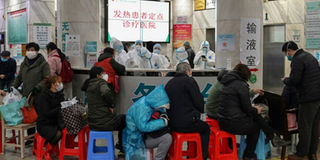We shouldn’t wait for coronavirus to hit us

People wait to see medical staff (back) in protective clothing at Wuhan Red Cross Hospital, in the Chinese city at the epicentre of the coronavirus epidemic. AFP Photo
What you need to know:
The issue:
Coronavirus
Our view:
We need to step up our screening efforts. Health ministry officials should also be able to prepare the necessary facilities should coronavirus cases be reported or detected in the country.
In yesterday’s editorial, we belaboured the need to prepare ourselves in the event that locusts, now ravaging parts of Kenya, invade us. One invasion of the locusts in Kenya is said to have mowed down vegetation on 24,000 square kilometers of land in a day, triggering fears that it could lead to famine in the affected areas.
Today, we focus on a distant yet threatening development in China. Wuhan, the capital of Central China’s Hubei Province, has been hit by the coronavirus that has killed 80 people and left more than 400 in critical condition.
The virus is said to have originated from a market where animals are sold. The virus is usually found in animals such as camels, civets and bats, and can be passed from animals to humans and then from human to human. The head of the World Health Organisation (WHO), Dr Tedros Adhanom Ghebreyesus, was yesterday scheduled to hold a special meeting with officials in Beijing to discuss how to contain the outbreak.
Media reports indicate that a total of 17 cities are now under lockdown, with several areas banning long-distance bus services, including Beijing, Shanghai, and the eastern Shandong Province.
But why should we worry about developments thousands of miles away? Over the past decade, China has become one of Uganda’s biggest trade partners. Chinese products have flooded the Ugandan market and Chinese themselves are doing business here.
Chinese in Uganda have also been involved in prospecting for oil, construction of hydro power dams, expanding airports, setting up telecommunications networks, opening up farms, and manufacturing floor tiles, foam mattresses, plastic sandals, and many other items.
On the other hand, there are hundreds of Ugandans studying, doing business or working in China. As such, there are numerous travels between the two countries on any given day, meaning there could be an easy spread of the virus.
China is doing all it can to reduce chances of infections. For instance, during what is China’s busiest travel season, officials said the end of this week’s lunar New Year holiday would be postponed until February 2. Authorities have also issued restrictions to movement to millions of people within the republic.
Like we have done at the airport and other entry points in cases of Ebola and other viruses, we need to step up our screening efforts. Health ministry officials should also be able to prepare the necessary facilities should coronavirus cases be reported or detected in the country.
Our commitment to you
We pledge:
• To be accurate and fair in all we do.
• To be respectful to all in our pursuit of the truth.
• To refuse to accept any compensation beyond that provided by Monitor Publications Ltd. for what we do in our news gathering and decision-making.
Further, we ask that we be informed whenever you feel that we have fallen short in our attempt to keep these commitments.
[email protected]




